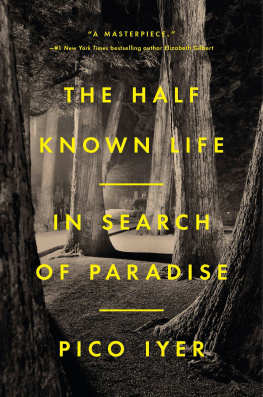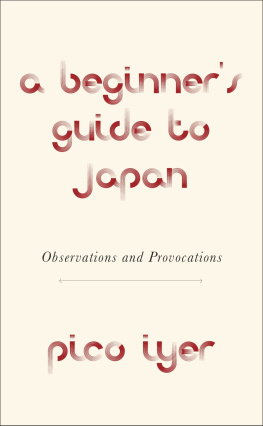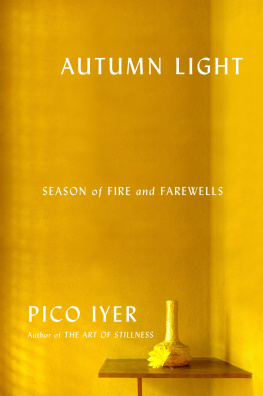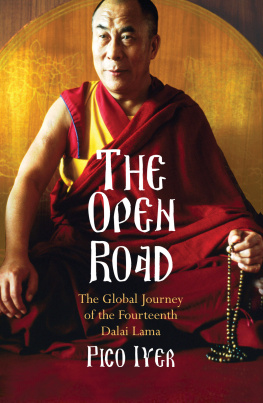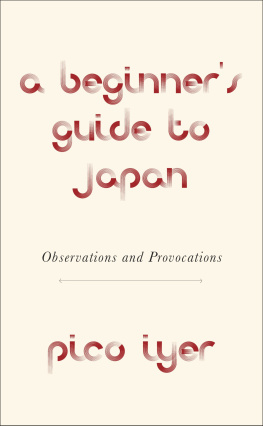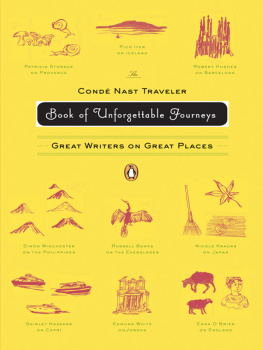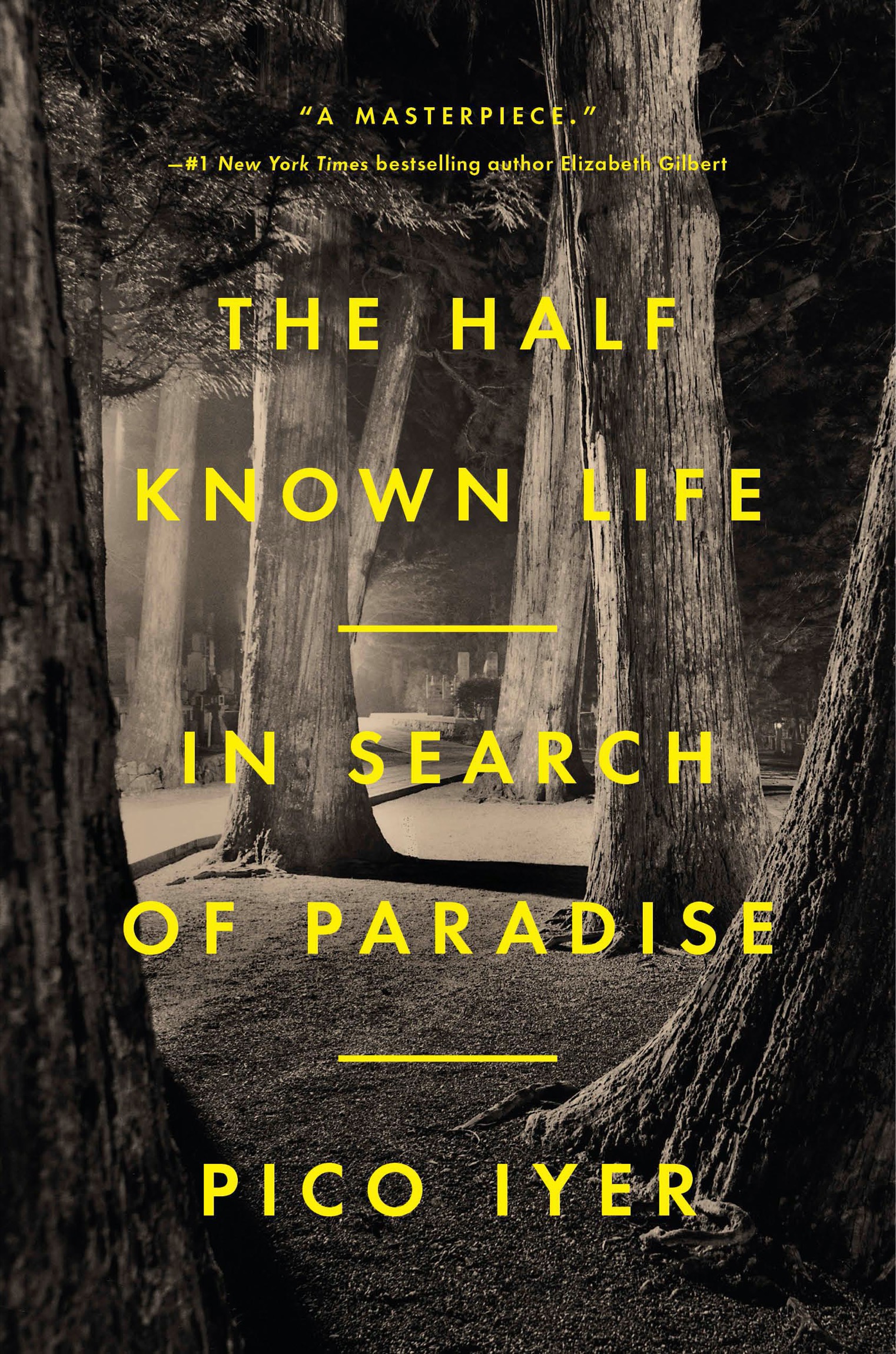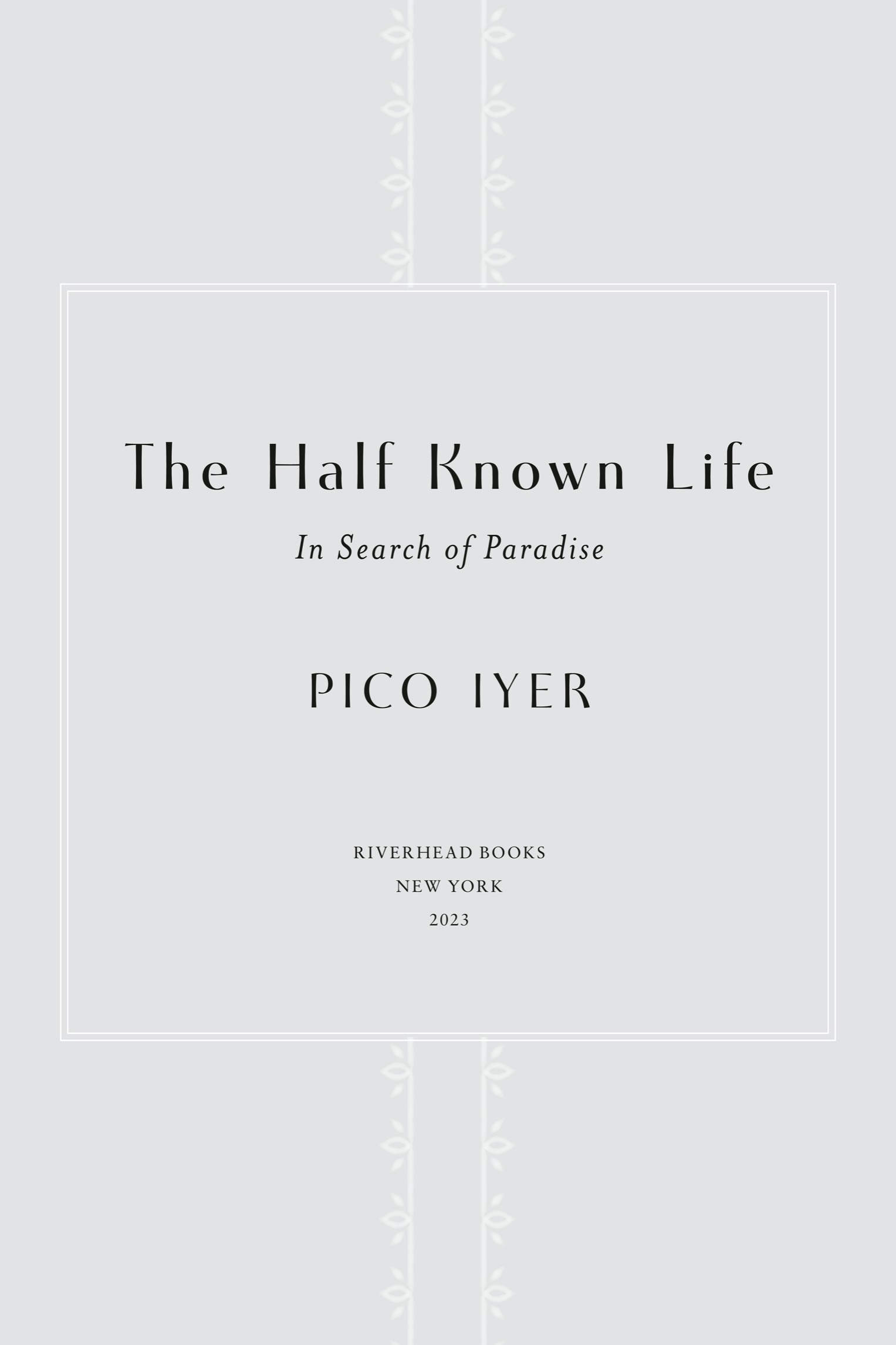ALSO BY PICO IYER
A Beginners Guide to Japan
This Could Be Home
Autumn Light
The Art of Stillness
The Man Within My Head
The Open Road
Sun After Dark
Abandon
Imagining Canada
The Global Soul
Tropical Classical
Cuba and the Night
Falling Off the Map
The Lady and the Monk
Video Night in Kathmandu

Riverhead Books
An imprint of Penguin Random House LLC
penguinrandomhouse.com

Copyright 2023 by Pico Iyer
Penguin Random House supports copyright. Copyright fuels creativity, encourages diverse voices, promotes free speech, and creates a vibrant culture. Thank you for buying an authorized edition of this book and for complying with copyright laws by not reproducing, scanning, or distributing any part of it in any form without permission. You are supporting writers and allowing Penguin Random House to continue to publish books for every reader.
Riverhead and the R colophon are registered trademarks of Penguin Random House LLC.
Grateful acknowledgment is made for permission to reprint lines from The Life of the Poet by Jean Arasanayagam. Reprinted with permission of Sarasavi Publishers Ltd.
Very small parts of this work appeared, some in significantly different form, in Cond Nast Traveler; Time; The New York Times, Sophisticated Traveler; the Financial Times; the Los Angeles Times; Cond Nast Traveller (India) and Bloomberg Businessweek.
Library of Congress Cataloging-in-Publication Data
Names: Iyer, Pico, author.
Title: The half known life : in search of paradise / Pico Iyer.
Description: New York : Riverhead Books, 2023. |
Identifiers: LCCN 2022002855 (print) | LCCN 2022002856 (ebook) | ISBN 9780593420256 (hardcover) | ISBN 9780593420270 (ebook)
Subjects: LCSH: Spiritual life. | TravelReligious aspects. | Paradise.
Classification: LCC BL628.8 .I94 2023 (print) | LCC BL628.8 (ebook) | DDC 203/.5dc23/eng20220726
LC record available at https://lccn.loc.gov/2022002855
LC ebook record available at https://lccn.loc.gov/2022002856
International edition ISBN: 9780593543962
Cover design: Lauren Peters-Collaer
Cover photograph: Michael Kenna
Book design by Amanda Dewey, adapted for ebook by Maggie Hunt
pid_prh_6.0_142226813_c0_r0
for
NANDINI IYER,
fellow traveler
19312021
With all your science can you tell how it is
& whence it is, that light comes into the soul?
Henry David Thoreau, July 1851
Contents
_142226813_
The Walled Garden
Four hours in Iran, and already I was having to rethink almost everything. The local guide whod greeted me as I stumbled out of Customs at three in the morning, elegant in black slacks and jacket, had begun to speak about his days at a boarding school near London in the 1970s. Wed pulled up at a luxury hotel, and Id heard the strains of Yesterday being plaintively piped through the lobby. In one corner of the palatial space, a small sign in English pointed to a tiny room: Mosque. Very close to it, a Swarovski shop was dripping in crystals and an Yves Rocher boutique promised this seasons offerings from Paris.
Now, as I strolled back from an early morning walk in the late summer sunlight, past a series of blue-glass towers lining the spotless, near-empty street, I saw Ali, my official Virgil, striding towards me with a smile. The lobby behind him was full, when we re-entered, of women tapping away on smartphones with rose-colored fingernails, strands of silky hair slipping out from under many a hijab.
Shall we make our first stop this morningAlis English would not have sounded out of place in Windsor CastleTus?
Actually, I was hoping we could go to the Imam Reza Shrine. Over eighteen months of correspondence with the Foreign Ministry in Tehran, Id taken pains to ensure my trip would begin in the holy city. I was less interested in a shadowy government that seemed to shift policies with every passing season than in a culture that had dazzled me from afar since boyhood with its jeweled verses and the flat visions of paradise magicked into being on its carpets. The central mosque in Mashhad, with its fourteen minarets, four seminaries, seven interlocking marble courtyards and cemetery, was said to be the largest such compound on the planet.
There are, said Ali, with what sounded like sculpted vagueness, a few complications today. Perhaps we should drive out into the country?
Captive for now, I followed my companion out to a car, where a burly older man, sporting a baseball capAustraliaabove his white shirt and chinos, was waiting to guide us through wide, tree-lined streets under large freeway signs in English. We passed a commanding statue, and Ali reminded me that Omar Khayyam, cradling an astronomical instrument above the modern boulevard, had invented a calendar more accurate than the Gregorian. Khayyam might be famous in England for his romantic quatrainsTake care to create your own paradise, here and now on earthbut in Iran he was best known for his transformative calculations.
We continued along quiet country roads that my guide could have likened to Oxfordshire, though these ones were lined with orchards of peaches and cherries. Ali spun beautifully brocaded sentences about double meanings and starlit nights, about how the same Farsi word was used for both garden and paradise. All Iran was a garden in the poetry of its local hero Ferdowsi, he explained; the same man had laid down both the outlines of a legal system and a code of courtly love. No, of course, our hotel wasnt quite the London Hilton on Park Lanehe stayed there often while taking Iranians on tours of Britainbut he hoped it might prove comfortable enough.
We were traveling out to the small town of Tus, Ali went on, because it was there that Ferdowsi was buried. Jalaludin Rumi might be famous across the West; his verses about giving himself up to the Beloved and flinging away holy books lent themselves perfectly to secular distortion. But it was Ferdowsi who had, in the eleventh century, given the entire culture an identity and a voice. His sixty-thousand-couplet epic, the Shahnameh, which those in the West called The Book of Kings, had hymned a new Farsi into being, over the thirty years it took to complete, much as Shakespeare had sent more than fifteen hundred words and phrases into modern English.
We drew up at last at a marble edifice, at the far end of a quiet, formal garden in which couples dressed as for a restaurant in Paris were strolling around and posing for photos. We stepped into the chamber where the poet was buried, and Ali pointed out scenes from the epic poem rendered along the walls in friezes, while two romancing lovers pored over verses that warned of the capricious ways of Fate.

